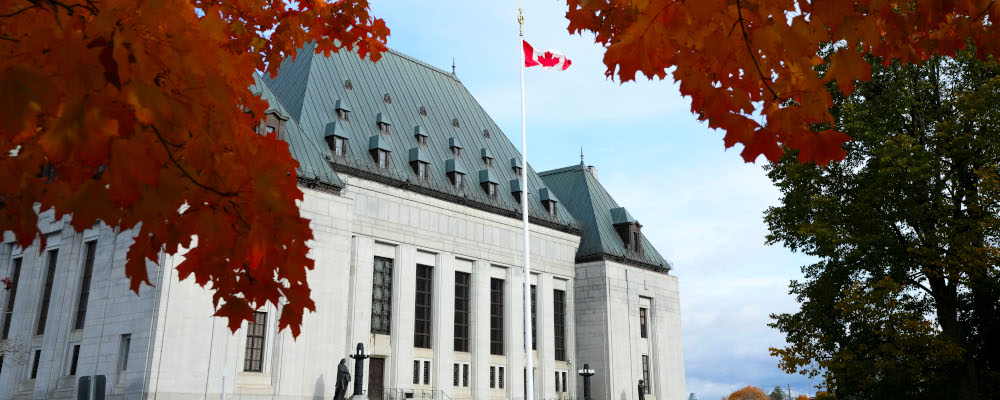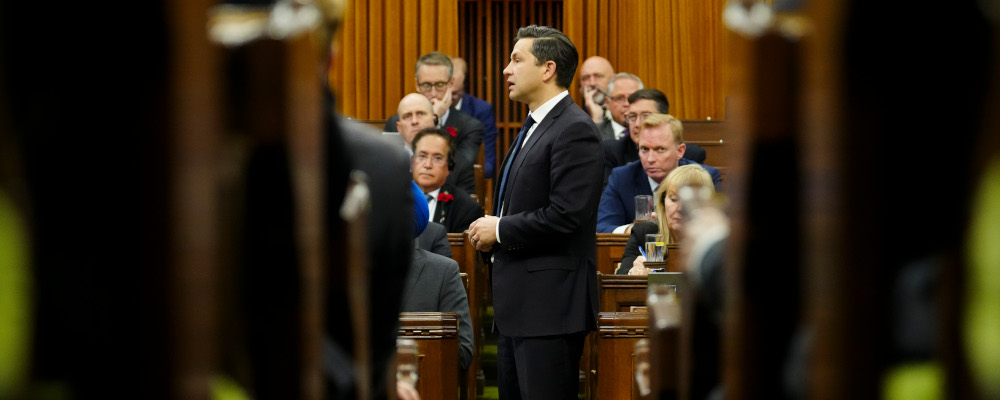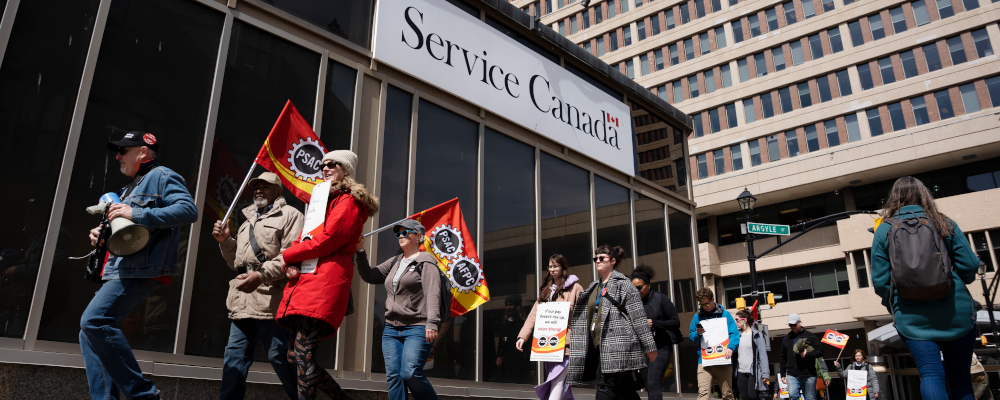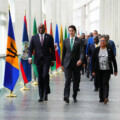Asked in a scrum last week for his position on the notwithstanding clause, Conservative Leader Pierre Poilievre replied: “Justin Trudeau believes that it’s alright for there to be concurrent sentences for a mass murderer who killed six innocent Muslims. Six innocent Muslims murdered, and he gets only 25 years. I think that’s a disgrace.”
“When I’m Prime Minister, he will stay behind bars and he will only come out in a box. It will be consecutive sentences,” he added. “So it’d be six life sentences. And we’re going to we’re going to make sure that it is jail, not bail. It’s going to be hard time for hard crimes.”
With these comments, Poilievre has reignited a national debate over the purpose and legitimate uses of the notwithstanding clause. While he didn’t go so far as to explicitly say he would invoke the notwithstanding clause in this instance, he did say he would use “whatever tools the Constitution allows.” The federal government has never invoked the notwithstanding clause so any invocation is bound to be controversial.

Poilievre’s comments also brought to the surface a vigorous current debate in the legal community between a group of scholars who believe the notwithstanding clause “overrides” rights and is therefore illegitimate in most cases, and a group who believe section 33 allows legislatures to disagree with courts about the extent or content of rights and is therefore legitimate in cases where Parliament thinks the courts got it wrong or has a different interpretation.
The comments also foreshadow a major storm that is brewing in the ongoing detente between courts and lawmakers over who gets to have the final word in society-wide moral dilemmas like addiction, gender, crime, and sexuality.
The pro-notwithstanding clause legal scholars including, for example, Geoff Sigalet of UBC Okanagan and Dwight Newman and the University of Saskatchewan see section 33 as setting up a dialogue between Parliament and the courts about the extent and content of rights. This is sometimes called the “coordinate approach” to rights protection. It maintains the principle of democratic legitimacy as foundational to our constitutional order and sees the use of the notwithstanding clause as an entirely legitimate part of the Constitution. We know from negotiations amongst provincial premiers leading up to the adoption of the Charter that excluding section 33 from its final text was a dealbreaker, particularly for the Prairie premiers, Allen Blakeney of Saskatchewan and Peter Lougheed of Alberta, who were of this view.
Under the coordinate approach, the constitutional supremacy clause in section 52, which says that any law which is contrary to the Constitution of Canada “is of no force or effect,” allows for both Parliament and the judiciary to define the scope of the meaning of constitutional rights. The rationale for this is that different branches of the state have different capacities and zones of expertise. For example, judges are best positioned to engage in legal analysis and apply precedent to specific factual scenarios before them, while Parliamentarians are representative of their constituencies and democratic preferences.
Under this view, legislative invocation of the notwithstanding clause is less a curtailment of rights than a different balancing of rights or a different interpretation of the requirements of Charter guarantees that were drafted broadly on purpose.
What, for example, does the right to be free from “cruel and unusual punishment” as guaranteed under section 12 of the Charter require? Surely, as a national community, there is relative consensus that this right protects against torture, deprivation of the essentials of life, and maybe even capital punishment. But what of imposing six consecutive life sentences—effectively, imprisonment for life with no reasonable prospect of parole—on Bissonnette? In R. v. Bissonnette, the Supreme Court held that such a sentence was “incompatible with human dignity.”
That’s not how most Canadians, including apparently Poilievre, see it. From his point of view, which is closer in proximity to regular Canadians, the need of the community to express its moral denunciation via a lifelong prison sentence must be counterbalanced against the abstract rigours of Charter jurisprudence conducted by a wise but sometimes out-of-touch group of elite judges. As Yuan Yi Zhu wrote in The Spectator, “Had the judges spoken to an actual member of the Canadian public, they might well have found that the average person in the street understands why a murderer can be given a 150-year sentence.”
Under the coordinate theory of section 33, Parliament gets the first crack at defining rights by promulgating laws. Courts then respond with a decision, usually prompted by a court challenge, offering analysis of the extent of the right. The legislature temporarily gets the last word because it can decide at that point whether to invoke the notwithstanding clause and let the law operate despite the court ruling. Parliament’s last word is indeed “temporary” because section 33 invocations automatically end after five years unless renewed. In that sense, it’s really voters who always get the last word.

Poilievre’s proposed usage of the notwithstanding clause, then, is consonant with those scholars who see section 33 as a necessary corrective when courts get it wrong. While the Supreme Court found that consecutive life sentences for the Quebec City mosque attacker without any chance at parole violated the prohibition in section 12 of the Charter against cruel and unusual punishment, Parliamentarians may disagree with this interpretation. Many legal scholars would argue his proposal to use section 33 is a wholly legitimate way of asserting Parliament’s view of rights.
The notwithstanding clause laid dormant, at least outside of Quebec, for the first thirty-five years of the Charter’s adoption, but has come into vogue with Ontario, Saskatchewan, and New Brunswick invoking it in recent years. It’s no coincidence that this followed a shift at the Supreme Court, beginning in the early 2010s, from a posture of relative deference to Parliamentary supremacy into a sort of super-legislature that felt empowered to weigh in on highly divisive moral issues that split Canadian society.
A clear example of this is the shift from 1993’s B.C. v Rodriguez, in which a slim majority of the Supreme Court upheld a Criminal Code provision against assisted suicide, to 2013’s Carter v. Canada, which unanimously concluded that the same provision violated the right to life, liberty, and security of the person.
We therefore may be witnessing a healthy re-balancing of the overall state system in the revivification of Parliamentary supremacy via the notwithstanding clause.
That said, while critics of the use of the notwithstanding clause are needlessly alarmist—for example allegations of authoritarianism like that made by a columnist in the Toronto Star are absurd—Poilievre would be well-advised to proceed with caution.
Under the coordinate theory of the notwithstanding clause, it may be perfectly legitimate for Poilievre to use it to assert Parliament’s view about whether the Supreme Court got it right in saying Bissonnette deserves a chance at parole. On the other hand, using the notwithstanding clause preemptively to block judges from weighing in on whether laws are constitutional—as we’ve seen recently with Saskatchewan’s law blocking preferred pronouns of school children and Quebec’s law banning religious symbols in the public service—is far murkier and more dangerous territory. The allegations that Poilievre is acting “authoritarian” or “overriding” rights would be a lot more convincing were he to engage in regular pre-emptive invocations of section 33.
Recommended for You

Ginny Roth: J.D. Vance, Pierre Poilievre, and how they slice their economic pie

David Polansky: As President Biden leaves the race, will the Democratic Party hodgepodge hold?

RCMP spending to protect MPs may have risen 112% since 2018, as Canadian politicians face greater rise in threats

Trevor Tombe: Canadians are paying billions in hidden taxes on new homes











